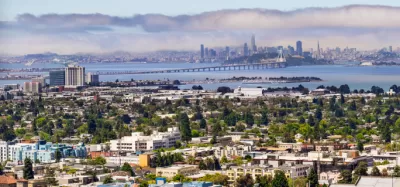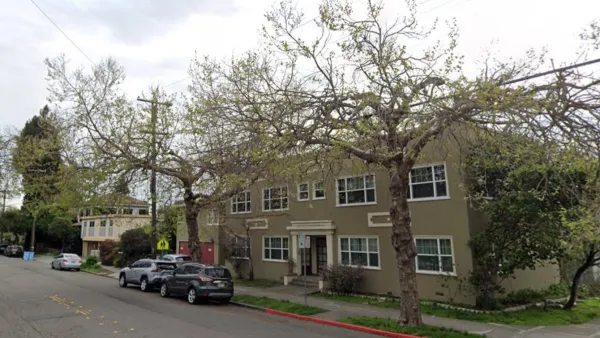Urban design critic John King urges fellow Berkeley residents to embrace change and growth.

Speaking at a “fireside chat” on October 3, San Francisco Chronicle urban design critic John King, a three-decade resident of Berkeley, called on that city’s residents to avoid letting nostalgia bar badly needed housing construction and other architectural change. Joanne Furio describes the talk for Berkeleyside.
King said some residents’ responses to the new construction will only hinder the creation of the projected 18,000 new housing units the city will need by 2040 to escape a housing crisis that’s caused property and rental prices to climb to stratospheric heights and driven people out of their homes in Berkeley and, in some cases, onto the street.
Despite the common image of Berkeley as an enclave of single-family homes and small buildings, “the real Berkeley, King said, includes other, more contemporary styles, too.” King showed photos of diverse building types, describing his criteria for aesthetically pleasing buildings and answering questions from the audience. “On the subject of opinions, King warned that longtime residents should not resist change just because they might have a nostalgic connection to a certain building or neighborhood.”
According to King, “You shouldn’t not change the landscape because the changes might impinge on your memory.” Change and growth are often necessary. “The larger challenge for Berkeley is how new buildings can be designed in a way that respects the public, the public culture and the public realm, he said.”
FULL STORY: Critic John King: Architectural nostalgia shouldn’t stop change in Berkeley

Planetizen Federal Action Tracker
A weekly monitor of how Trump’s orders and actions are impacting planners and planning in America.

Maui's Vacation Rental Debate Turns Ugly
Verbal attacks, misinformation campaigns and fistfights plague a high-stakes debate to convert thousands of vacation rentals into long-term housing.

Restaurant Patios Were a Pandemic Win — Why Were They so Hard to Keep?
Social distancing requirements and changes in travel patterns prompted cities to pilot new uses for street and sidewalk space. Then it got complicated.

In California Battle of Housing vs. Environment, Housing Just Won
A new state law significantly limits the power of CEQA, an environmental review law that served as a powerful tool for blocking new development.

Boulder Eliminates Parking Minimums Citywide
Officials estimate the cost of building a single underground parking space at up to $100,000.

Orange County, Florida Adopts Largest US “Sprawl Repair” Code
The ‘Orange Code’ seeks to rectify decades of sprawl-inducing, car-oriented development.
Urban Design for Planners 1: Software Tools
This six-course series explores essential urban design concepts using open source software and equips planners with the tools they need to participate fully in the urban design process.
Planning for Universal Design
Learn the tools for implementing Universal Design in planning regulations.
Heyer Gruel & Associates PA
JM Goldson LLC
Custer County Colorado
City of Camden Redevelopment Agency
City of Astoria
Transportation Research & Education Center (TREC) at Portland State University
Jefferson Parish Government
Camden Redevelopment Agency
City of Claremont





























